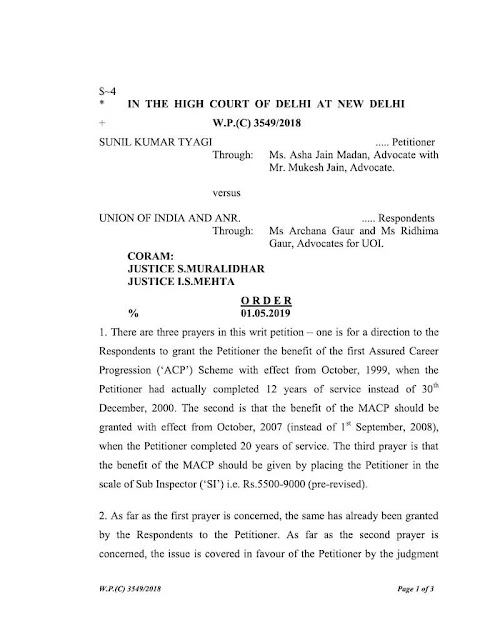MACP is entitled from the date of completion
of 10/20/30 years and not from 01.09.2008 -
Delhi High Court Order
MACP is entitled from the date of completion of 10/20/30 years and not from 01.09.2008 - Delhi High Court Order
Delhi High Court on 1.5.2019 in WP (C) No. 3549/2018 (Sunil Kumar Tyagi, BSF Vs UOI) had held that MACP is entitled from the date of completion of 10/20/30 years and NOT from 1.9.2008.
Earlier the Supreme Court on 8.12.2017 in Union of India Vs Balbir Singh Turn (Civil Appeal Diary No. 3744/2016 had held that MACP is effective from 1.1.2006 as per 6th Pay Commission recommendation, as it forms part of Pay and NOT allowances.
Ministry of Defence issued orders on 25.07.2018 to implement the SC judgment but the DoPT / MoF did not issue similar orders for the civilian employees.
IN THE HIGH COURT OF DELHI AT NEW DELID
W.P.(C) 3549/2018
SUNIL KUMAR TYAGI
|
..... Petitioner
| |
Through:
|
Ms. Asha Jain Madan, Advocate with
Mr. Mukesh Jain, Advocate.
| |
versus
| ||
UNION OF INDIA AND ANR
|
..... Respondents
| |
Through:
|
Ms Archana Gaur and Ms Ridhima
Gaur, Advocates for UOI.
|
CORAM:
JUSTICE S.MURALIDHAR
JUSTICE I.S.MEHTA
O R D E R
01.05.2019
1. There are three prayers in this writ petition - one is for a direction to the Respondents to grant the Petitioner the benefit of the first Assured Career Progression ('ACP') Scheme with effect from October, 1999, when the Petitioner had actually completed 12 years of service instead of 30th December, 2000. The second is that the benefit of the MACP should be granted with effect from October, 2007 (instead of 1'1 September, 2008), when the Petitioner completed 20 years of service. The third prayer is that the benefit of the MACP should be given by placing the Petitioner in the scale of Sub Inspector ('SI') i.e. Rs.5500-9000 (pre-revised).
2. As far as the first prayer is concerned, the same has already been granted by the Respondents to the Petitioner. As far as the second prayer is concerned, the issue is covered in favour of the Petitioner by the judgment dated 8th December, 2017 of the Supreme Court in Union of India v. Balbir Singh Turn (2018) I I SCC 99. The Supreme Court has in the above judgment clarified that the benefit of the MACP which was on the basis of the recommendations of the Sixth Central Pay Commission to be extended with effect from 1st January, 2006 and not from 1st September, 2008, as was directed by the Respondents.
3. As regards the fixing of the correct pay scale of the Petitioner, it is seen that in BSF/General Duty, there is no post of ASI/General Duty in the pay scale of Rs.4000-100-6000 (pre-revised) which had been converted into Pay Band-I i.e. 5200-20200 in the grade pay of Rs.2800 having pay band of 8560 with the total pay (basic pay) of Rs.11360. Thus, in the case of the Petitioner, the second financial upgradation was required to be given in the pay scale of Rs.5500-9000 (pre-revised). Since this was not granted to other similarly placed as the Petitioner, writ petitions were filed in this Court. A series of judgments have been passed by this Court in those writ petitions, as a result of which the Respondents extended the benefit of financial upgradation in the pay scale of Rs.5500-9000 to all personnel who had completed 24 years of regular service during the period 9th August, 1999 to 31st August, 2008.
4. The counter affidavit of the Respondents does not dispute the applicability of the judgment of the Supreme Court in Union of India v Balbir Singh Turn (supra) or the applicability of the other orders of this Court, including the order dated 18th December, 2015 in W.P.(C) No.11725 (Digamber Singh ASI v UOI) concerning the appropriate pay scale for the purposes of grant of the MACP benefits.
5. Consequently, this Court directs as under:
- The Petitioner would be given the benefit of the MACP with effect from October, 2007 instead of 1st September, 2008; and
- The above benefit will be given by placing the Petitioner in the pay scale of of Sub Inspector i.e. 5500-9000 (pre-revised).
- The appropriate orders will be issued and the arrears will be paid to the Petitioner within a period of 12 weeks from today, failing which the Respondents will be liable to pay simple interest @ 6% per annum on the arrears for the period of delay.
6. The petition is disposed of in above terms. No costs.
S. MURALIDHAR, J.
I.S.MEHTA, J.
MAY 01, 2019ujj




No comments:
Post a Comment